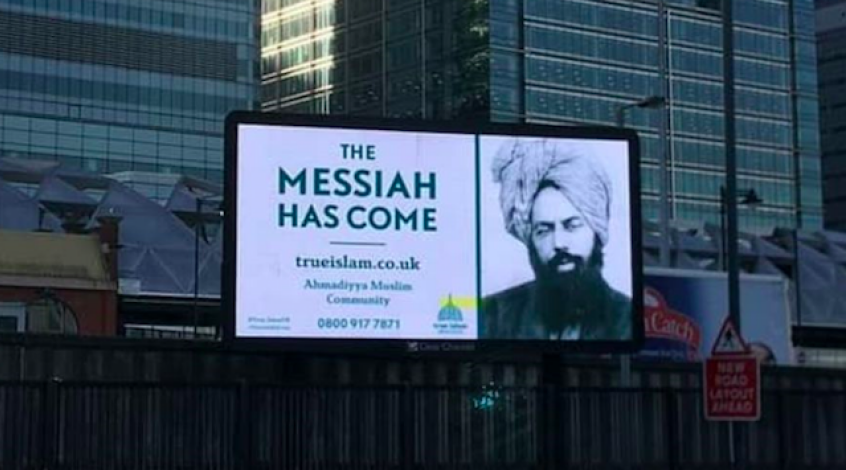Dozens of complaints have been launched over an Islamic advertising campaign claiming the 'Messiah has come'.
Launched by the Ahmadiyya Muslim Community, a heavily persecuted minority Muslim sect, a series of billboards in London, Manchester and Glasgow aim to promote the idea, considered heretical by mainstream Islam, that the Messiah promised in the Qur'an has already come in the person of Mirza Ghulam Ahmad.

But the campaign has prompted outrage from Christians, Muslims and Jews who all have notions of a 'messiah' in their beliefs and find the billboards offensive.
The Advertising Standards Authority confirmed to Christian Today it has received 33 complaints so far about the adverts. A spokesman said people have claimed the post is 'misleading because they believe it is not consistent with the teachings of the Quran'.
He said: 'Due to the perceived misrepresentation of Muslim beliefs, complainants also consider the ad offensive on this basis.'
The ASA is assessing the complaints and will make a ruling this week as to whether there are grounds for further investigation.
But a spokesman for the True Islam Campaign said it was crucial Ahmadi Muslims were allowed to express their beliefs.
'Every individual and group has the right to manifest and profess their faith and to curb this would not only be a breach of basic human rights but contrary to the values of freedom of speech and expression which we cherish in this country,' Farooq Aftab told Christian Today, adding that Ahmadis are one of the oldest and most integrated Islamic community in the UK.
He said the advert was being targeted in a coordinated campaign by other Muslim sects.
An email template seen by Christian Today and sent to Ahmadi opponents claimed 'the billboard incites hatred, it is deeply offensive and hurtful to millions of British citizens'. The email urges other Muslims to write to the ASA, the Metropolitan Police and the Charity Commission asking them to take the billboards down.
But Aftab said: 'It is not for states, authorities or organisations to interfere in religious matters. There needs to be a clear separation of State and Church so to speak, otherwise we will go down a very slippery slope with groups or people trying to monopolise religion. No one can determine someone's faith. This is a matter between God and the individual and the hallmark of a pluralistic and democratic society.'
Ahmadis believe that Mirza Ghulam Ahmad, a 19th century Indian cleric, is the second coming of Jesus and subservient to the prophet Muhammed within Islam. Ahmadiyya Muslims are shunned by other Islamic groups and in Pakistan a law was passed in 1978 that meant Ahmadis could not describe themselves as Muslims. This has allowed hardline clerics to preach against Ahmadis who they consider a dangerous cult.
Such is the extent of persecution, the Ahmadi leader, or Caliph, had to flee Pakistan and move his main base to London in 1984. For the last three decades, the UK capital has been the home of the global Ahmadiyya community.
Thousands have now fled to the UK after the first Ahmadi mosque was built in London in 1926 and there are now more than 30,000 Ahmadiyya in Britain.













